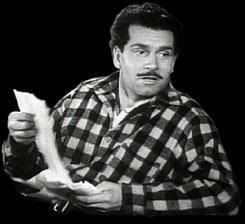July 1 marks Canada Day, marking the 1867 anniversary of the UK's granting of dominion status to Canada. Canadians celebrate by being thankful they're not Americans, while we Americans celebrate by repeating our favorite Canadian stereotypes. That, and we celebrate all the famous Canadians who escaped to America to become successful in the movies, from Mary Pickford to Mike Myers, and then some. Perhaps the best known Hollywood movie set in Canada is Johnny Belinda, although it wasn't filmed in Canada: the coast of northern California substitutes for Nova Scotia. However, it's not just Americans who have stereotypes about Canadians; Brits do, too. The British look at Canada can been seen in one of the more remarkable movies from World War II, 49th Parallel.
The genesis of this movie is that World War II started in Europe two years before the Japanese bombed Pearl Harbor, meaning that for the first two years, the Americans were officially neutral. The British government wanted to encourage Americans to get behind the British, and so commissioned director Michael Powell, and his frequent collaborator Emeric Pressburger, to make a propaganda movie aimed at Americans. The result was 49th Parallel, but it's a very atypical propaganda movie. The basic story line is that a Nazi U-boat gets stuck in Canadian waters and, while a landing party goes ashore to get provisions, is bombed out of the water, leaving six of the Nazis stranded at a Hudsons Bay trading post. These six then try to make their way south to the still-neutral United States (the 49th parallel being the line of latitude that forms the US-Canada border from Washington to Minnesota), where they can be repatriated to Germany. This being officially part of the war effort, quite a few stars appeared, taking on small roles for less pay than normal: Laurence Olivier (seen in the photo at left) is first among them, playing a hilariously miscast Québecois trapper (complete with horrendous accent and about a dozen siblings; thank you Catholic stereotypes); Leslie Howard plays one of his usually weak roles, as an anthropologist with a taste for modern art (what the Nazis call "degenerate") who only cares about the fight against the Nazis when they try to destroy his paintings; and Raymond Massey as a soldier who's gone AWOL but still loves his country.
This being officially part of the war effort, quite a few stars appeared, taking on small roles for less pay than normal: Laurence Olivier (seen in the photo at left) is first among them, playing a hilariously miscast Québecois trapper (complete with horrendous accent and about a dozen siblings; thank you Catholic stereotypes); Leslie Howard plays one of his usually weak roles, as an anthropologist with a taste for modern art (what the Nazis call "degenerate") who only cares about the fight against the Nazis when they try to destroy his paintings; and Raymond Massey as a soldier who's gone AWOL but still loves his country.
The propaganda, such as it is, is sometimes blatant, notably in a sequence set at a commune of the pacifist Hutterite sect (the young Hutterite girl is played by a gorgeous Glynis Johns in one of her earliest performances). However, a lot of the time, it's much more below the surface, requiring viewers to think. The Nazis aren't portrayed as simply evil; they're also shown to be clever and manipulative, trying to play on what would have been natural divisions within Canada. Watch how the Nazis appeal to Olivier with a mention of the latent Québecois irredentism; that's something a Canadian filmmaker would probably never have done. One can only imagine what the America Firsters would have thought about this movie.
Ironically, 49th Parallel was ultimately not needed: Japan bombed Pearl Harbor before the movie was released, so by the time Americans could see it, the US was already in the war. Having said that, though, the movie was still wildly successful, in no small part due to the fact that it's much more than just propaganda. It's a darn good thriller. True, since it's supposed to be propaganda, you know the Nazis are ultimately going to fail in their attempt to make it to America. But seeing exactly how they fail is still a surprise. In addition to the excellent story, there's also a majestic score by Ralph Vaughan Williams, and wonderful location photography. 49th Parallel is available on DVD, and a movie I strongly recommend.
A Last Hurrah?
5 hours ago

No comments:
Post a Comment